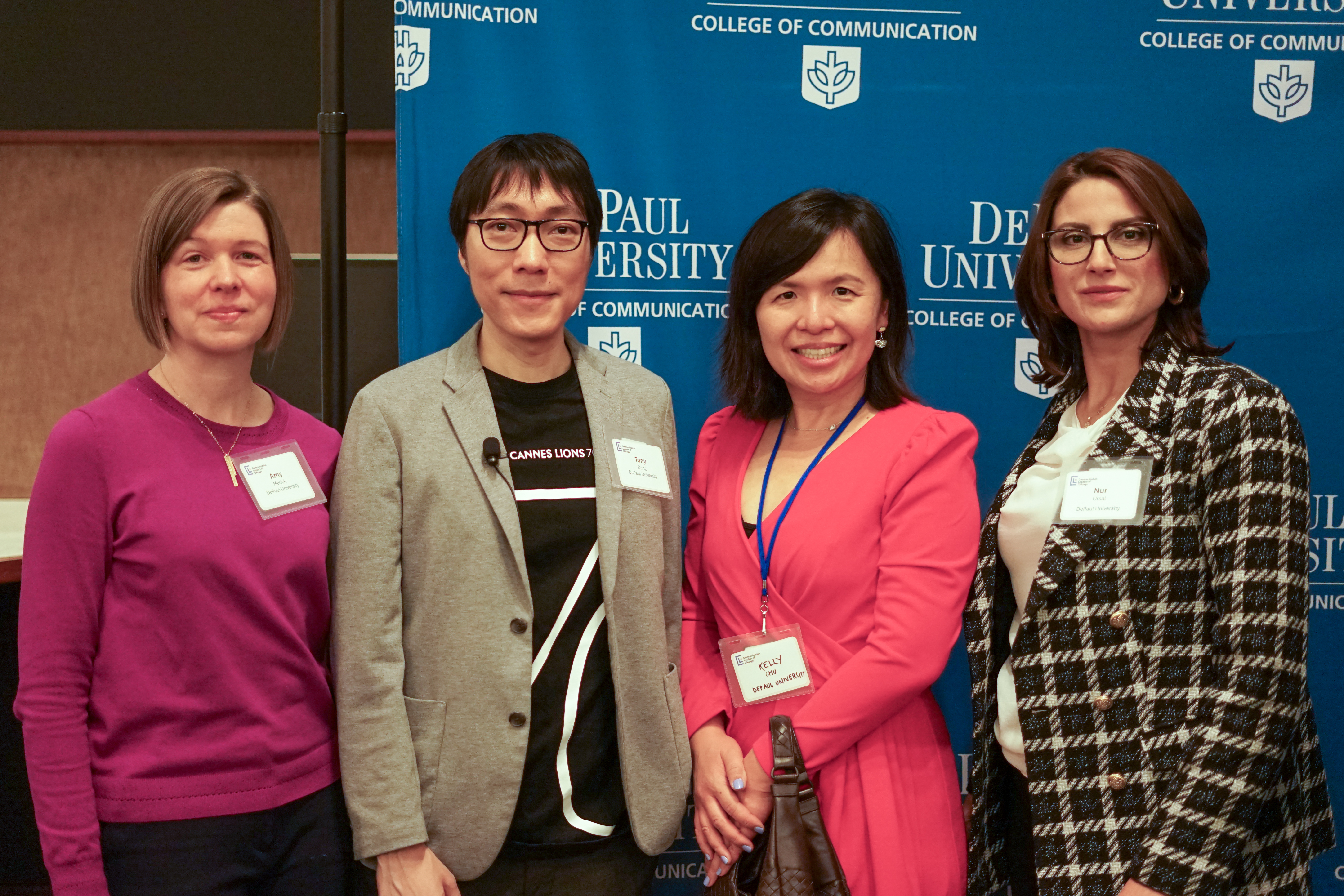
Professors Tao “Tony” Deng and Nur Uysal at the Communication Leaders of Chicago conferenceFrom classrooms to boardrooms, people are buzzing about how artificial intelligence will upend the field of communications. At DePaul, faculty, students and industry leaders are coming together to shape that future.
Tao “Tony" Deng, assistant professor of public relations and advertising, and Nur Uysal, associate professor of public relations and advertising, research how advertising and communications professionals integrate AI into their work. Their AI-Human Communication Research Project explores how AI affects human communication, aiming to understand its processes and outcomes. Recently, they met up with Communication Leaders of Chicago to bridge academia and industry. A survey of leaders shows there is a lot to talk about.
“We're working to uncover AI's influence on communication strategies, address ethical concerns and enhance human interaction," Deng says.
The project will offer professional development opportunities, including workshops and online training, tailored for public relations and advertising professionals. Their goal is to foster AI-driven communication research, establish DePaul University as a leader in this field and generate revenue.
“AI will be a positive force for communication for professionals and students," Uysal says. “We just need to understand how to better use it and implement it in our daily practices, so it'll increase the efficiency of our work."
In a recent survey of industry experts, Deng and Uysal found this to be true.
Earlier this year, the pair surveyed more than 80 Chicago-area communication leaders about AI. The project was underwritten by the College of Communication's Center for Communication Engagement. They presented the findings earlier this year to 60-some attendees on DePaul's Loop Campus.
“I'm particularly fascinated by the statistics. Most of the respondents had positive attitudes toward AI programs but when thinking about their clients, there was a financial worry," Deng says. “Respondents were worried that their clients would start to use AI to help solve their communications problems instead of coming to a PR firm or an advertising firm to serve their strategic needs."
Survey respondents were communication leaders and senior professionals at corporations, agencies and other organizations based in the Chicago area. Participants averaged nearly 30 years of experience in communications.
A significant 78 percent of respondents expressed positive attitudes, ranging from slightly to extremely positive, towards AI adoption. Similarly, 62 percent of their clients, encompassing both internal corporate clients and external stakeholders, shared this positive outlook. Negative sentiments regarding AI adoption were notably scarce.
That said, companies have work to do to catch up. Merely 33 percent of the surveyed individuals indicated that their organizations presently maintain a dedicated department or team tasked with overseeing AI utilization. Among these establishments, various structures such as AI compliance groups, governance committees and AI task forces, along with communication labs, have been established to manage AI initiatives effectively.
As with most things at DePaul, research is being applied in the classroom.
DePaul senior Alexia Galinsky recently used artificial intelligence in a project for Deng's class. The assignment was to create an ad campaign for Beyond Meat Burgers.
Using AI software, Galinsky crafted a persona named Emily Greenway, labeled as the "Culinary Explorer." Emily was detailed as a 32-year-old urban professional with a keen interest in health-conscious food. Her interests and behaviors included liking Pinterest, Instagram and wellness podcasts.
The AI then showed Galinsky how her creative campaign would reach this persona and gave examples such as storytelling, educational content and recipe collaborations. Galinsky says that this project and learning to use AI will help her career in creative advertising moving forward.
“A lot of people are worried that AI is going to take over our jobs, but that's simply a misconception," Galinsky says. “I think being able to use AI will set you apart in the job market to receive more opportunities."
The next phase of the initiative aims to involve more students in AI research and translate the findings into actionable insights for PR and advertising pros. To learn more about the project, visit the College of Communication website here.